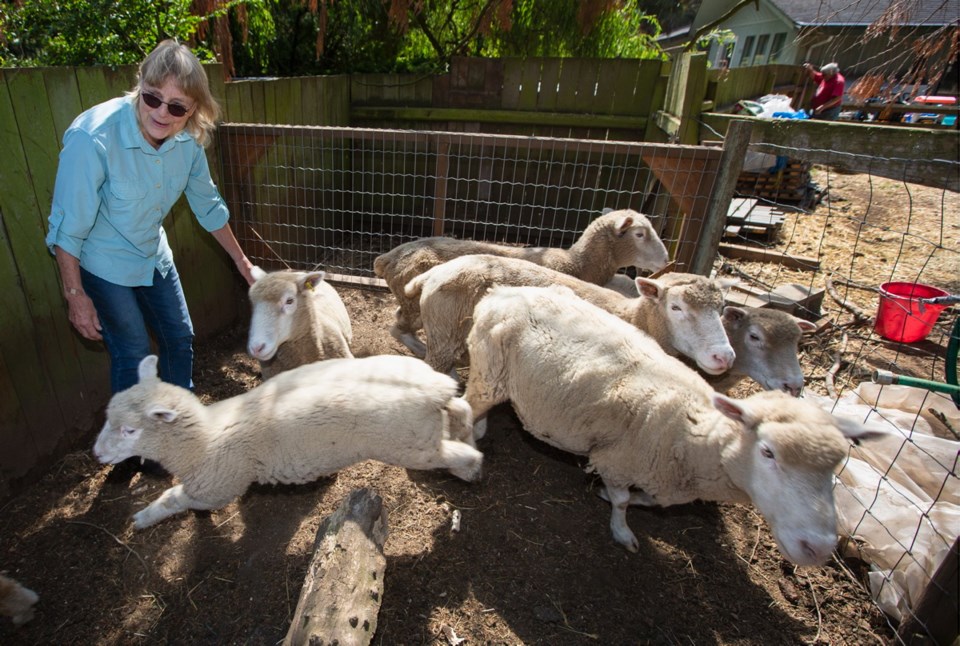Bev Bacon has a metal ski pole at her back door and a baseball bat at the front.
And she’s ready to defend her flock of 30 sheep from a problem bear with a taste for mutton that has been on a killing rampage in Metchosin this spring and summer.
Farmers in the rural area have lost 17 sheep this year, including Bacon’s beloved Number 87, a yearling she was keeping as breeding stock. It had been grazing in a neighbour’s yard when the bear killed and ate it over the August long weekend.
A trail camera attached to a tree captured the big black bruin eating the carcass and dragging it over a fence.
Bacon said she made frantic calls to the B.C. Conservation Service, but got no reply. The bear slipped away, again.
She has since herded her small flock into her front yard, which is protected by a high fence, and has her large Maremma guardian dog, Maria, keeping a watchful eye.
The latest incident has farmers frustrated over the losses and the community fearful of what it perceives as a problem bear that could attack people.
Mayor John Ranns called the animal “a public threat,” saying the bear has lost its fear of humans and could be a danger to residents and others using Metchosin’s trails.
He has urged conservation officers to use dogs to track the culprit bear from kill sites.
The B.C. Conservation Service did not respond to requests for an interview.
But Sgt. Scott Norris said in a radio interview this week “there is no easy solution” to the problem.
In an interview on CFAX, he said a bear was shot in early June by a Metchosin landowner after it attacked a sheep, but the sheep killings have continued. “Kill one [bear] and another moves in.”
“Education and prevention is a big part of our role,” said Norris, noting the conservation service has urged farmers to use guard dogs, install electric fencing and lock up their flocks at night.
But many farmers, including John Buchanan, who runs about 700 sheep on pastures scattered all over the Lower Island, say the recommendations are cost prohibitive and logistically difficult.
Buchanan and Bacon have floated the idea that farmers could buy or build their own bear trap and, under direction from the conservation service, set it quickly in the area where the bear has made a kill.
Bacon said the conservation service is urging “timely reporting” for the best chances to catch the guilty bear.
“I understand that we don’t want to destroy the wrong bear,” she said. “We did our timely reporting on the morning and throughout the day on Aug. 2 for the kill that was made on the night of Aug. 1. We got no action.
“We had a fresh kill that we knew the bear was likely to come back to, cameras on the carcass and the fence. The bear came back on Aug. 2 at 11 p.m. We had the perfect opportunity to get the problem bear red-faced.”
Bacon said a quick response to move a trap that was already in Metchosin would have done the job. “Or, failing that, they could have used hounds on the following day to track the scent of that bear leading away from the kill,” she said.
Lorraine Buchanan, who operates Parry Bay Sheep Farm with her husband, John, said they have lost seven sheep this year. She said it’s difficult to do daily accurate counts of their flock in every pasture, which are often filled with brush. “Sometimes, we only find out when we see birds going to a carcass,” she said.
Bacon has “a lot of respect” for the conservation service, but said it has to act soon before more sheep die or a person is attacked. “What seems obvious to me, after talking with [Norris] is that the conservation officers are too few and trying to cover too many calls,” said Bacon. “Why don’t they hire more staff? The [conservation officers] we have are very capable, but they are running as fast as they can.”
She also believes there have been fewer decisions to put down problem bears since a conservation officer was fired after refusing to kill two bear cubs near Port Hardy in 2015.
“We seem to have had a pendulum swing from killing all the carnivores that show up in the wrong place to now killing none of them, even when they are far too bold and destructive,” said Bacon. “The decision-making seems to be at the administrative or political level and appears to be a knee-jerk reaction to public sympathy, outrage, or fear, whichever emotion is most loudly voiced at the time.”
Bacon wants a balanced approach — “education, all due protective measures for livestock and removing problem predators that are repeat offenders.”



